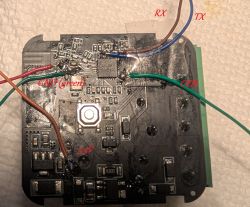What is the variable type event_buttons.event ?

Czy wolisz polską wersję strony elektroda?
Nie, dziękuję Przekieruj mnie tam



![[RTOS][esp-idf] ESP32 interrupts and shuffles some basic questions [RTOS][esp-idf] ESP32 interrupts and shuffles some basic questions](https://obrazki.elektroda.pl/5227655200_1628187093_thumb.jpg) .
.
#define BUTTON_DOWN (1)
#define BUTTON_UP (2)
#define BUTTON_HELD (3)![[RTOS][esp-idf] ESP32 interrupts and shuffles some basic questions [RTOS][esp-idf] ESP32 interrupts and shuffles some basic questions](https://obrazki.elektroda.pl/7073588900_1628188229_thumb.jpg) .
.NIXIE_123 wrote:Nothing is highlighted anymore and everything works as expected.
khoam wrote:.IDE can affect the operation of the code in ESP
khoam wrote:.But in which version of the callback function?
![[RTOS][esp-idf] ESP32 interrupts and shuffles some basic questions [RTOS][esp-idf] ESP32 interrupts and shuffles some basic questions](https://obrazki.elektroda.pl/1028143100_1628258101_thumb.jpg) .
.
![[RTOS][esp-idf] ESP32 interrupts and shuffles some basic questions [RTOS][esp-idf] ESP32 interrupts and shuffles some basic questions](https://obrazki.elektroda.pl/3388673200_1628258484_thumb.jpg)
conf.clk_flags = 0;khoam wrote:directly manipulate GPIO W1TS registers once GPIO W1TC8923e5bb6 .
And it works! I have no panic. I've made myself 4 "map" arrays in RAM and in the interrupt just writes values from them to w1ts
I removed the set_catode() function entirely
It normally connects to the wifi even at 35µs. There is only one side effect
Solution as above without wifi:
-everything works I have no comments
Solution as above with wifi:
-no adc works when code from wifi starts. Clock works normally just doesn't dim (well, because there is no adc)
So I paste in the code the diagnostics(last line):.Code: C / C++Log in, to see the code
And the processor has a panic exactly when the last line is called. I remove it it works without a working adc
![[RTOS][esp-idf] ESP32 interrupts and shuffles some basic questions [RTOS][esp-idf] ESP32 interrupts and shuffles some basic questions](https://obrazki.elektroda.pl/1528202800_1628598661_thumb.jpg)
Initialisation of adc:.Code: C / C++Log in, to see the code
https://www.esp32.com/viewtopic.php?t=9972
Solution:
you need to disable wifi by.Code: C / C++Log in, to see the code
Only RMT(led_strip) does not work, not sure why
Oh, it's working now. Apparently it was still trying to connect in the background and delayed calling esp_wifi_stop()




